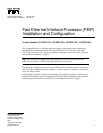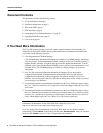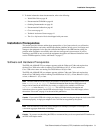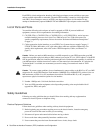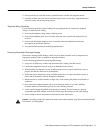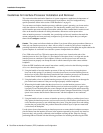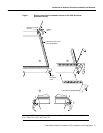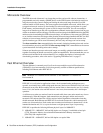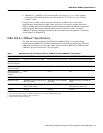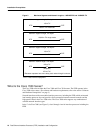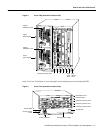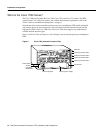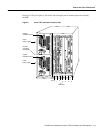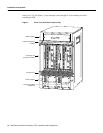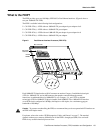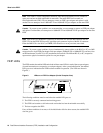
Fast Ethernet Interface Processor (FEIP) Installation and Configuration 3
Installation Prerequisites
• To obtain information about documentation, refer to the following:
— World Wide Web on page 40
— Documentation CD-ROM on page 40
— Ordering Documentation on page 40
— Documentation Feedback on page 40
— Cisco.com on page 41
— Technical Assistance Center on page 41
— The Cisco Information Packet that shipped with your router.
Installation Prerequisites
This section provides software and hardware prerequisites, a list of parts and tools you will need to
perform the installation, and safety and ESD-prevention guidelines to help you to avoid injury and
damage to the equipment. It also provides a detailed description of the OIR function to help you
perform online installation successfully and avoid error message and system restarts. If you are
installing a new FEIP, be sure to review the equipment descriptions and distance limitations in the
section “FEIP Receptacles, Cables, and Pinouts” on page 17.
Software and Hardware Prerequisites
The FEIP with 100BASE-TX port adapters operates with the CxBus and CyBus and requires that
the host Cisco 7000 series router is running Cisco IOS Release 10.3(5), or later, and the host
Cisco 7500 series routers are running Cisco IOS Release 10.3(6) or later.
The FEIP with 100BASE-FX port adapters operates with the CxBus and CyBus and requires that
the host Cisco 7000 family router is running Cisco IOS Release 10.3(13), or later, Release 11.0(10),
or later, or Release 11.1(5), or later.
Note The latest FEIP microcode images are available via anonymous File Transfer Protocol (FTP)
from /ftp/feip-fx at ftp.cisco.com. Detailed information about the latest FEIP microcode
images can be found in the ASCII file feip.readme.txt, which is also available via FTP from
ftp.cisco.com in the directory /ftp/feip-fx/. This ASCII file includes information and
instructions on how to get the current FEIP microcode image. To access Cisco IOS images, refer to
the section “Cisco.com” on page 41 at the end of this publication.
Caution If you use the FEIP with a single port adapter, you must have the port adapter in slot 0 for the FEIP
to function properly. A single port adapter in slot 1 will not be recognized by the system.
Note Each FE interface on an FEIP can be configured at 100 Mbps, half duplex or full duplex, for
a maximum aggregate bandwidth of 200 Mbps.
Caution To prevent oversubscribing the FEIP, we recommend that you do not operate both FE interfaces on
an FEIP in full-duplex mode.



